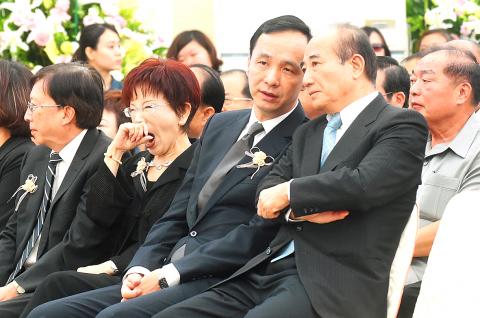The Democratic Progressive Party (DPP) yesterday urged Chinese Nationalist Party (KMT) Chairman Eric Chu (朱立倫) to clarify the KMT’s stance on cross-strait relations, as KMT presidential hopeful Hung Hsiu-chu (洪秀柱) has criticized President Ma Ying-jeou’s (馬英九) cross-strait policy and appears to be heading in a pro-unification direction.
“Hung seems to be taking a very different view on cross-strait policies from those of Ma and Chu, and actually Taiwanese are still struggling to understand how she actually thinks,” DPP spokesperson Wang Min-sheng (王閔生) told a news conference at the party’s headquarters in Taipei. “[Cross-strait policy] is a very serious issue and therefore Hung and the KMT are obliged to explain it clearly to the public.”
The deputy legislative speaker has criticized Ma’s “one China with different interpretations” and “no unification, no independence, no use of force” as his main principles in cross-strait relations, saying that such ideas would eventually lead to Taiwanese independence, so she said that the two sides should agree to “one China, same interpretation.”

Photo: Liao Yao-tung, Taipei Times
“Hung did not explain what ‘same interpretation’ means, or clearly what she meant by ‘one China,’” Wang said.
He said that while Hung last month said that Taiwan and China are two Chinese governments under “one China,” on Monday she said in an interview that her idea of “one China” is asking the People’s Republic of China to recognize the existence of the Republic of China.
“As a presidential hopeful, Hung should make herself clear about the issue to the people,” Wang said.
As next month’s KMT national congress is set to pass a new political agenda, Wang questioned whether Ma’s “one China with different interpretations,” Chu’s “both sides belong to ‘one China’” or Hung’s proposal of signing a cross-strait peace agreement under “one China, same interpretation” would be written into it.
“Is the KMT going to be switching to the direction of pushing for accelerating cross-strait unification? This is a question that Chu should answer,” Wang said.

US President Donald Trump yesterday announced sweeping "reciprocal tariffs" on US trading partners, including a 32 percent tax on goods from Taiwan that is set to take effect on Wednesday. At a Rose Garden event, Trump declared a 10 percent baseline tax on imports from all countries, with the White House saying it would take effect on Saturday. Countries with larger trade surpluses with the US would face higher duties beginning on Wednesday, including Taiwan (32 percent), China (34 percent), Japan (24 percent), South Korea (25 percent), Vietnam (46 percent) and Thailand (36 percent). Canada and Mexico, the two largest US trading

AIR SUPPORT: The Ministry of National Defense thanked the US for the delivery, adding that it was an indicator of the White House’s commitment to the Taiwan Relations Act Deputy Minister of National Defense Po Horng-huei (柏鴻輝) and Representative to the US Alexander Yui on Friday attended a delivery ceremony for the first of Taiwan’s long-awaited 66 F-16C/D Block 70 jets at a Lockheed Martin Corp factory in Greenville, South Carolina. “We are so proud to be the global home of the F-16 and to support Taiwan’s air defense capabilities,” US Representative William Timmons wrote on X, alongside a photograph of Taiwanese and US officials at the event. The F-16C/D Block 70 jets Taiwan ordered have the same capabilities as aircraft that had been upgraded to F-16Vs. The batch of Lockheed Martin

China's military today said it began joint army, navy and rocket force exercises around Taiwan to "serve as a stern warning and powerful deterrent against Taiwanese independence," calling President William Lai (賴清德) a "parasite." The exercises come after Lai called Beijing a "foreign hostile force" last month. More than 10 Chinese military ships approached close to Taiwan's 24 nautical mile (44.4km) contiguous zone this morning and Taiwan sent its own warships to respond, two senior Taiwanese officials said. Taiwan has not yet detected any live fire by the Chinese military so far, one of the officials said. The drills took place after US Secretary

THUGGISH BEHAVIOR: Encouraging people to report independence supporters is another intimidation tactic that threatens cross-strait peace, the state department said China setting up an online system for reporting “Taiwanese independence” advocates is an “irresponsible and reprehensible” act, a US government spokesperson said on Friday. “China’s call for private individuals to report on alleged ‘persecution or suppression’ by supposed ‘Taiwan independence henchmen and accomplices’ is irresponsible and reprehensible,” an unnamed US Department of State spokesperson told the Central News Agency in an e-mail. The move is part of Beijing’s “intimidation campaign” against Taiwan and its supporters, and is “threatening free speech around the world, destabilizing the Indo-Pacific region, and deliberately eroding the cross-strait status quo,” the spokesperson said. The Chinese Communist Party’s “threats